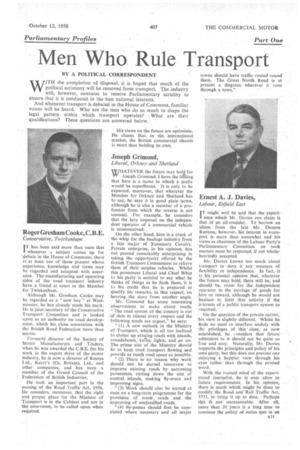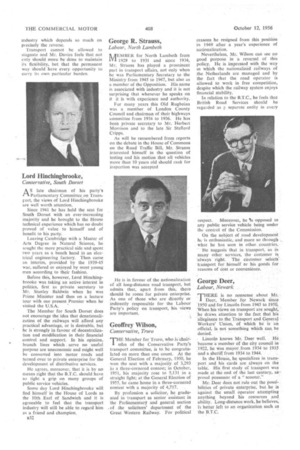Men Who Rule Transport
Page 65

Page 66

If you've noticed an error in this article please click here to report it so we can fix it.
BY A POLITICAL CORRESPONDENT
W1TH the completion of disposal, it is hoped that much of the political acrimony will be removed from transport. The industry will, however, continue to receive Parliamentary scrutiny to ensure that it is conducted in the best national interests.
And Whenever transport is debated in the House of Commons, familiar voices will be heard. Who are the men who do so much to shape the legal pattern within which transport operates? What are their qualifications? These questions are answered below.
I T has been said more than once that whenever a subject comes up for debate in the House of Commons, there is at least one of those present whose experience, knowledge and views may be regarded and accepted with assurance. The manufacturing and operating sides of the road transport industry have a friend at court in the Member for Twickenham.
Although Mr. Gresham Cooke may be regarded as a "new boy" at Westminster, he has already made his mark. He is joint secretary of the Conservative Transport Committee and is looked upon as an authority on road development, which his close association with the British Road Federation more than merits.
Formerly director of the Society of Motor. Manufacturers and Traders, when he was awarded the C.B.E. for his work in the export drive of the motor industry, he is now a director of Rootes Ltd., Kerry's (Gt. Britain), Ltd., and other companies, and has been a member of the Grand Council of the Federation of British Industries.
He took an important part in the passing of the Road Traffic'Act, 1956. He considers, moreover, that the right and proper place for the Minister of Transport is in the Cabinet and not in the ante-room, to be called upon when required. His views on the future are optimistic. He claims that, in the international market, the British commercial chassis is more than holding its .own.
Joseph Grimond,
Liberal, Orkney and Shetland
WHATEVER the future may hold for Joseph Grimond, I have the feeling that here is a name to which a prefix would be superfluous. It is only to be expected, moreover, that whatever the Member for Orkney and Shetland has to say, he says it in good plain terms, although he is also a member of a profession from which the reverse is not unusual. For example, he considers that the levy imposed on the independent operator of a commeicial vehicle is misconceived.
On the other hand, here is a crack of the whip for the haulage industry from a late major of .Yeomanry Cavalry. Private enterprise, in his opinion, has not proved remarkably enterprising in taking the opportunity offered by the British Transport Commission to relieve them of their surplus vehicles. Whilst this prominent Liberal and Chief Whip to his party is entitled to say what he thinks of things as he finds them, it is to his credit that he is prepared to qualify his remarks„ in this respect, On bearing the story from another angle.
Mr. Grimond has some interesting observations to make about roads. "The road system of the country is out (of date in almost every respect and the following needs are urgent," he says: "(1) A new outlook in the Ministry of Transport, which is all too inclined to clutter up existing roads with islands, roundabouts, kerbs, lights, and so on. The prime aim of the Ministry should be to keep road transport flowing and provide as much road space as possible.
"(2) There is no reason why work should not be started tomorrow to improve existing roads by narrowing pavements, cutting down the size of central islands, making fly-overs and improving signs. "(3) Work should also be started at once on a long-term programme for the provision of trunk, roads and the improving of unclassified roads. "(4) By-passes should first be corn-. pleted where necessary and all major towns should have traffic routed round them. The Great North Road is at present a disgrace wherever it runs through a town."
IT might well be said that the experi
ence which Mr. Davies can claim is that of an all-rounder. To borrow an idiom from the late Mr. Damon Run-yon, however, his interest in transport is more than somewhat and his views as chairman'of the Labour Party's Parliamentary Committee on such matters must be respected, if not wholeheartedly accepted.
Mr. Davies knows too much about transport to deny it any measure of flexibility or independence. In fact, it is his personal opinion that, whatever the future may hold, there will be, and should be, room for the independent operator in the carriage of goods for hire or reward, although he would not hesitate to limit that activity if the irterests of a public transport system so required.
On the question of the private carrier, his view is slightly different. Whilst he finds no need to interfere unduly with the privileges of this class, as now established, he onsiders that future admission to it should not be quite so free and easy. Naturally, Mr. Davies supports the principles and policy of his own party, but this does not prevent one enjoying a happier view, through his eyes rather than through the printed word.
With the trained mind of the experienced journalist, he is ever alive to future requirements. In his opinion, there is much which might be done to modify the Road and Rail Traffic Act, 1933, to bring 'it up to date. Perhaps this ts not unreasonable. After aH, more than 20 years is. a long time to continue the policy of status quo in an
industry which depends so much on precisely the reverse.
Transport cannot be allowed to stagnate and Mr. Davies feels that not cnly should more be chine to maintain its flexibility, but that the permanent way should have every opportunity to carry its own particular burden.
AS late chairman of his party's Parliamentary Committee, on Transport, the views of Lord Hinchingbrooke are well worth attention.
Since 1941 he has held the seat for South Dorset With an ever-increasing majority and he brought to the House technical experience which has no doubt proved of value to himself and of benefit to his party.
Leaving Cambridge with a Master of Arts Degree in Natural Science, he sought the more practical side and spent two years as a bench hand in an electrical engineering factory. Then came an interim, provided by the 1939-45 war, suffered or enjoyed by most young men according to their fashion.
Before this, however, Lord Hinchingbrooke was .taking an active interest in politics, first as private secretary to Mr. Stanley Baldwin when he was Prime Minister and then on a lecture tour with our present Premier when he visited the
The Member for South Dorset does not encourage the idea that denationalization of the railways will afford any practical advantage, or is desirable, but he is strongly in favour of decentralization and modification in their financial control and support in his opinion, branch line.s which serve no useful purpose are uneconomic and might well he converted into Motor roads and turned over to private enterprise for the development of distributive services.
He agrees, moreover, that it is by no means right that the B.T.C. should have so tight a grip on many groups of public service vehicles.
Some day Lord Hinchingbrooke will find himself in the House of Lords as the 10th .Earl of Sandwich and it is agreeable to feel that the transport industry, will still. be able to regard him as a friend and champion.
n32
George R. Strauss,
Labour, North Lambeth
ilEMBER for North Lambeth from IV' 1929 to 1931 and since 1934, Mr. Strauss has played a prominent part in transport affairs, not only when be was Parliamentary Secretary to the Ministry from 1945 to 1947, but also as a member of the Opposition. His name is associated with industry and it is Dot surprising that whenever he speaks on it it is with experience and authority.
For many years this Old Rugheian was a mernber of London County Council and chairman of their highways committee from 1934 to 1936. He has been private secretary to Mr. Herbert Morrison and to the late Sir Stafford Cripps.
As will he remembered from reports on the debate in the House of Commons on the Road Traffic Bill, Mr. Strauss interested himself in the question of testing and his motion that all vehicles more than' 10 years old should rank for inspection was accepted He is in favour of the nationalization of all long-distance road transport, brit admits that, apart from this, there should be room for private enterprise. As one of those who are directly or indirectly responsible for the Labour Party's policy on transport, his views are important.
Geoffrey Wilson,
Conservative, Truro THE Member for "fruro, who is-chair-ran of the Conservative Party's transport committee, is to be congratulated on more than one court. At the General Election of February, 1950, he won the seat with a majority, of 3,293 in a three-cornered contest; in October, 1951, his majority rose to 5,131 in a straight fight; at the General Election of 1955, he came home in a three-cornered contest with a majority of 4,717. . By profession a solicitor, he graduated in transport as senior assistant in the Parliamentary and general section . of the solicitors' department of the Great Western Railway. For political
reasons he resigned from this position in 1949 after a year's experience of nationalization.
Nevertheless, Mr. Wilson can see no good purpose in a reversal of this policy. He is impressed With the way in which the nationalized railways of the Netherlands are managed and by the fact that the road operator is allowed to work in free competition, despite which the railway system enjoys financial stability.
In relation to the B.T,C., he feels that British Road Services should be regarded as e separate entity in every respect. Moreover, he Is opposed to any public service vehicle being under the control of the Commission.
On the subject of road development hL•is enthusiastic,. and more so through e what he has seen in other. countries.
He suggests that in transport, as in many other services, the customer is, nlWays• -right The customer .selectS transport forhimself or his goods for reasons of cost or convenience,
George Deer,
Labour, Newark .
THERE is no nonsense . about Mr., Deer, Member for Newark since 1950 and for Lincoln from 1945 to 1950. When lais.views on transport are sought, be draws attention to the fact that hiS allegiance to the Transport 4.tid Genera Workers' Union, of which he is-an official, is not something which can., be denied.
. Lincoln knows Mr. Deer well. He became a-member of the city council in .1922, he Was mayor from 1934'tó 1935 and a sheriff from 1934 to 1944.
In the House, he specializes in trans-. port and his cards are always on the table. His first study of transport was made at the end of the last century, asproud possessor of a scooter."
Mr. Deer does not rule out the possibilities of .private -enterprise, but he is against the small operator attempting anything beyond his resources and ability. Long-distance work, he believes, ie better left to an organization such as the B.T.C.




















































































































